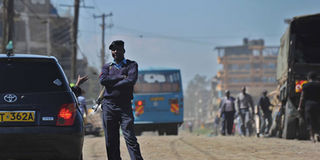In war against terror, nations cite power to revoke citizenship

A police officer stops a motorist at a road block Eastleigh, Nairobi on April 9, 2014. "This eating message trickles down to our security services, whose capacity to line their pockets has expanded exponentially". PHOTO/FILE
What you need to know:
- Seventeen months later, a US drone streaked out of the sky in the Lower Shabelle region of Somalia and killed Sakr.
- In many Western countries, citizenship is considered a right that cannot be taken away except in very limited cases.
- Britain, along with Israel, is one of the few countries that can revoke the citizenship of dual nationals.
LONDON
The letter informing Mohamed Sakr that he had been stripped of his British citizenship arrived at his family’s house in London in September 2010.
Sakr, born and raised here by British-Egyptian parents, was in Somalia at the time and was suspected by Western intelligence agencies of being a senior figure in Al-Shabaab, a terrorist group linked to al-Qaeda.
Seventeen months later, a US drone streaked out of the sky in the Lower Shabelle region of Somalia and killed Sakr.
An intelligence official quoted in news reports called him a “very senior Egyptian,” though he never held an Egyptian passport.
A childhood friend of Sakr, Bilal al-Berjawi, a Lebanese-Briton also stripped of his citizenship by the British government, had been killed in a drone strike a month earlier, after having escaped an attack in June 2011.
Senior US and British officials said there was no link between the British government’s decision to strip the men of their citizenship and the subsequent drone strikes against them, though they said the same intelligence may have led to both actions.
But the sequence of events effectively allowed the British authorities to sidestep questions about due process under British law, mirroring the debate in the United States, and now Kenya, over the rights of citizens who are deemed terrorist threats.
In many Western countries, citizenship is considered a right that cannot be taken away except in very limited cases, such as serving in another nation’s military or having obtained citizenship fraudulently.
Others strip citizenship from people who take another passport.
Britain, along with Israel, is one of the few countries that can revoke the citizenship of dual nationals — even if they are native born — if they are suspected or convicted of terrorist offences or acts of disloyalty.
Britain is seeking to expand the practice to naturalised citizens who have no other nationality and would be rendered stateless.
Citizenship, in the words of Home Secretary Theresa May, is a “privilege, not a right.”
In Britain, there is some unease at the implications.
Sakr, who was killed in February 2012, had appealed on the grounds that the British government was rendering him stateless.
He had never sought an Egyptian passport despite being eligible for one because of his parents’ heritage.
He eventually abandoned his appeal for fear that frequent communication with his lawyer on a cellphone or computer would make him vulnerable to a drone strike by giving away his location, according to his lawyer at the time, Saghir Hussain.
Al-Berjawi was killed in January 2012, hours after using a cellphone to call his wife in a London hospital on the day their son was born.
In a case involving the US, a Somali-born Briton, Mahdi Hashi, was stripped of his British citizenship in June 2012 and then captured and detained on a US base in Djibouti two months later.
He was taken to the United States, where he awaits trial on terrorism-related charges.
“The sequence of events does not look accidental,” said Hussain, who is also representing Hashi in a separate appeal.
(New York Times Syndicate)




